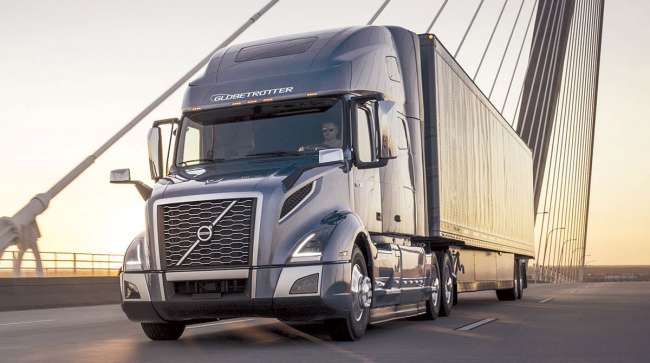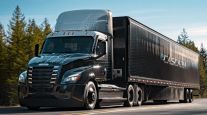Senior Reporter
US Class 8 Retail Sales in July Present Mixed Picture

[Stay on top of transportation news: Get TTNews in your inbox.]
Class 8 U.S. retail sales in July rose 21.9% higher compared with a year earlier but stalled when measured against the past four months, Wards Intelligence reported. All truck makers but one reported gains.
July sales hit 20,513 compared with 16,824 in the 2021 period.Year-to-date sales were 132,694, or 3.4% higher compared with 128,376 in 2021, according to Wards.
Industry analysts also said July’s sales number showed the supply chain remains interrupted and restricted exactly as it has been for the previous four months — when U.S. Class 8 retail sales averaged 20,620.
“We have hit a sales ceiling right now,” said Don Ake, vice president of commercial vehicles at FTR, “and we can’t get above it. My sources are telling me that they are getting no supply chain improvement in August.”

Tam
Steve Tam, vice president at ACT Research, said, “It’s the same litany of things over and over. They just won’t go away, sadly.”
Volvo Trucks North America reported the highest sales gain. It rose an unusual 139.1% to 2,123 sales compared with 888 a year earlier, good for a 10.3% share in the month. VTNA is a unit of Volvo Group.
“Last year we had an eight-week strike at our plant in Dublin, Va., so that’s why a year-over-year comparison doesn’t make complete sense,” said Magnus Koeck, vice president of strategy at VTNA. The strike ended in July, and the United Auto Workers said at the time July 19 was the definite day to report back to work.

Koeck
“Year-to-date, our retails are up both in the U.S. and in Canada. We’re now at 11.3% share in the U.S. compared with 9% a year earlier,” he said. “We are still anticipating disturbances in the supply chain for various components throughout the next quarter, which paired with labor and material shortages will continue to impact deliveries throughout the current quarter.”
Mack Trucks posted a 3.4% gain as sales inched up to 1,295 compared with 1,252 a year earlier, and it earned a 6.3% share in the month. Mack also is a Volvo Group brand.
International, a brand of Navistar Inc., posted the sole decline. Sales dropped 15% to 2,229 compared with 2,623 a year earlier. Its July share stood at 10.9.%

Host Mike Freeze gets Jason Gies, Navistar's VP of eMobility, to spill the tea on everything from how fleets are charging now to how far policymakers are willing to go to up the public electric truck charging game. Tune in above or by going to RoadSigns.TTNews.com.
“Freightliner remained the market leader with 7,855 sales, or 34.4% more — which was the second-highest gain — compared with 5,845 in the 2021 period. It notched a 38.3% market share in the month.
Freightliner is a brand of Daimler Truck North America.
Western Star, also a DTNA brand, sold 552 trucks compared with 450 in the 2021 period for a 22.7% increase and 2.7% share.
Peterbilt Motors Co. notched a 24% gain as sales climbed to 3,392 compared with 2,735 a year earlier, and it earned a 16.5% share.
Kenworth Truck Co. inched 1.2% higher on sales of 3,067 compared with 3,031 in the 2021 period. It earned a 15% share in July.
Kenworth and Peterbilt are brands of Paccar Inc.
“We are not back to our optimized efficiencies, but very darn efficient, I think, from a standpoint of how we’re producing the new trucks and what they’re bringing,” Paccar CEO Preston Feight said during the company’s July 26 earnings call. “We’re going to continue to make sure we build as many trucks as we can, and that’s really our first priority.”

Feight
He added that fleet age is up 10% to 15%, truck utilization is high, and freight tonnage and volumes also are at high levels.
“We think those set up the market for a strong future for truck sales,” Feight said.
ACT bumped up its 2022 U.S. Class 8 forecast.
“We are at 258,000, up from 253,000 previously, which was an 11% increase above 2021,” Tam said, “and that’s in recognition of the indication we are getting for the truck makers that they may be making a little bit of progress on the supply chain.”
At the same time, ACT reduced its 2023 forecast for U.S. Class 8 retail sales to 228,000 compared with its previous estimate of 246,500.
He pointed to the higher prices of everything, the jitteriness of local or domestic politics and in the geopolitical environment.
Want more news? Listen to today's daily briefing above or go here for more info
“The Fed’s actions are going to take time to slow inflation, and then once inflation slows, it is going to take time for the consumers to get back in the pool,” Tam said.
Meanwhile, “a couple of truck makers have opened up for orders, but not everyone has,” he said.
At the end of June, 223,000 units were in backlog for North America, Tam said, and 200,000 are scheduled for delivery by the end of this year.
“So we only have 23,000 sitting out there for next year.” he said. “That’s almost all in Q1.”
So how large is the still-unmet demand for new trucks?
It can’t be gauged until all the truck makers open up for orders, Tam said, and only a few have.
“If we see 30,000 orders for several months, that’s a strong signal that there is still lots of demand that hasn’t been fulfilled,” he said. “But if we see 10,000, that suggests we need to tighten our belts a little bit.”




